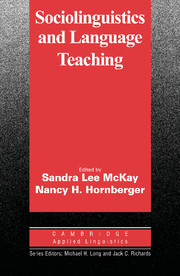Book contents
- Frontmatter
- Contents
- List of contributors
- Series editors' preface
- Preface
- Acknowledgements
- Part I LANGUAGE AND SOCIETY
- 1 Language attitudes, motivation, and standards
- 2 Societal multilingualism
- 3 World Englishes
- 4 Language planning and policy
- Part II LANGUAGE AND VARIATION
- Part III LANGUAGE AND INTERACTION
- Part IV LANGUAGE AND CULTURE
- CONCLUSION
- Index
1 - Language attitudes, motivation, and standards
Published online by Cambridge University Press: 22 July 2009
- Frontmatter
- Contents
- List of contributors
- Series editors' preface
- Preface
- Acknowledgements
- Part I LANGUAGE AND SOCIETY
- 1 Language attitudes, motivation, and standards
- 2 Societal multilingualism
- 3 World Englishes
- 4 Language planning and policy
- Part II LANGUAGE AND VARIATION
- Part III LANGUAGE AND INTERACTION
- Part IV LANGUAGE AND CULTURE
- CONCLUSION
- Index
Summary
So, if you really want to hurt me, talk badly about my language. Ethnic identity is twin skin to linguistic identity – I am my language. Until I can take pride in my language, I cannot take pride in myself.
(Anzaldúa, 1987, p. 59)Language is an intimate part of social identity. Anzaldúa testifies to the deeply felt bond between language and selfhood, a bond demanding that any language variety used by speakers during natural communication take its place as a legitimate form of expression. For teachers, her words suggest that respect for all forms of language used in the communities in which they teach is essential. At the same time, in all school settings, language is always the medium and sometimes the object of formal study. Often, teachers have a particular responsibility for certain aspects of language instruction, whether they be acquisition of native language literacy skills or skills in a second language. How can teachers carry out their charge while respecting the languages and language varieties that students bring to school and using existing language skills to build new ones? How can teachers enable students to achieve the linguistic mastery that will allow them access to both further opportunities and personal satisfaction, if students so desire?
Teachers have long asked themselves why some students excel in a subject but others, generally similar in background, academic preparation, and experience, struggle with or ignore it.
Information
- Type
- Chapter
- Information
- Sociolinguistics and Language Teaching , pp. 3 - 46Publisher: Cambridge University PressPrint publication year: 1995
Accessibility standard: Unknown
Why this information is here
This section outlines the accessibility features of this content - including support for screen readers, full keyboard navigation and high-contrast display options. This may not be relevant for you.Accessibility Information
- 6
- Cited by
